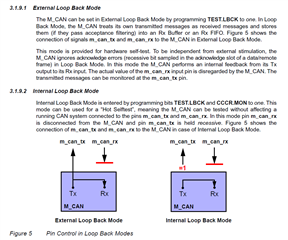Other Parts Discussed in Thread: TCAN4550,
HI TI Team:
I encountered a problem when debugging Tcan4550 sending. After sending a frame of data, Tcan4550 will always send this frame. Is this normal? Is it some kind of mode turned on? How to close?
I tried turning on one shot mode use command "canconfig can0 ctrlmode one-shot on", but it didn't work or even sent.
there is no a second node connected to the CAN bus.
How can I make sure my driver is ok in this case?


